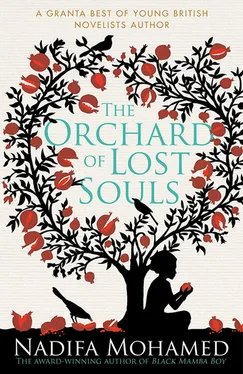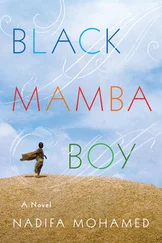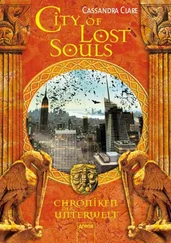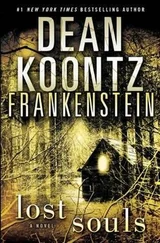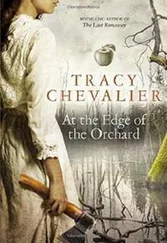Each holds a scrap of the blanket and Kawsar believes for a moment that this is her funeral, that they will wrap her in this blanket and grasp handfuls of sand to throw over her, burying her wide-eyed and pliant.
‘This way, this way,’ Maryam leads them to Kawsar’s bungalow.
A break in the men’s bodies reveals a slice of October Road: children in their scruffy playclothes watch the hullabaloo with quizzical expressions.
‘Just here.’ Maryam bangs the metal gate with her fist.
Kawsar expects to see Dahabo but the door is opened by a stranger, a young girl in men’s clothing.
‘Let us through,’ orders Maryam.
Kawsar and the girl’s eyes meet as they pass, suspicion reflected in both.
Kawsar is propelled through the hallway and into the bedroom, which smells peculiar — a sharp cocktail of sweets and cheap perfume — and falls onto the bed with a soft thud.
The bedroom is dark, gauzy blue. At the end of a shaft of moonlight is the girl, asleep under a thin sheet on the floor. Her ribcage rises softly under the covers, a small, beautiful quiver of animated air. Nobody else has slept overnight under this roof since Hodan died. Kawsar’s pulse quickens. She is excited to have someone to watch, to hear in the background; she will share this space that she has roamed alone for so long.
The next morning the girl wakes Kawsar by wiping a wet cloth over her face and neck as she lies in bed.
‘What are you doing?’ stutters Kawsar.
‘I was told to bathe you.’
‘Are you an undertaker preparing me for burial? Can’t you wait until I am awake?’
‘I thought I would save time.’
‘That is not the way to save time.’ Kawsar snatches the cloth from her hand. ‘What is your name, who are you?’
‘Nurto, I am a cousin of Maryam’s. I am here to look after you.’
She is a tall girl, all legs and arms, with a sharp, belligerent face atop a thin neck.
‘You will only stay with me if I’m happy with your work.’
‘So what do you want me to do now?’
‘Go to the market, there is no food in the house.’
Nurto leaves for the suuq and does not return for hours.
It is strange to think that Nurto will be the one to find her lifeless one day. What will she do — scream, say a prayer, or quickly throw a sheet over the stiff, wide-eyed corpse? For some reason this imagined scene makes Kawsar laugh — the perfect revenge of the old on the thoughtlessly young.
A loud bang heralds Nurto’s return and Kawsar listens as the girl goes straight past the bedroom to the kitchen and unloads the basket into crates on the floor. Later, she pushes open the bedroom door with her foot, her skinny legs in black corduroy trousers, and enters carrying a tray.
She has bought the things she desires with the shopping money: pastries, halwa , biscuits, and now makes a show of presenting them to Kawsar on a tray, as if she could want these things.
There is a knock at the door and Nurto rushes to open it. Maryam pops her head into the room. She kisses Kawsar’s cheek and feels her forehead.
‘How is Nurto behaving?’
‘She’s fine,’ Kawsar says curtly. ‘Take a seat.’
‘I can’t stay right now. I just wanted to give you these.’ She pulls a packet from her alligator-skin handbag. Her mother in East London has sent powerful painkillers and Maryam reads the instructions aloud, carefully and slowly struggling to translate terms such as ‘hypertension’ and ‘water retention’. But as soon as Maryam follows Nurto into the kitchen, Kawsar takes six of the pills and waits expectantly for the girdle of pain to release a fraction.
In the afternoon light her room looks institutional, with just a single iron bed, a metal chair, a bare light bulb and two large wardrobes full of clothes she never wears and never will again. Above the bed hangs her art: the fine, abstract textiles she has hand-loomed herself, woven straw hangings she bought in Juba, her wedding photo in a frame she painted in the blue and white of the Somali flag with crescent moons and irregular exploding stars. The only ostentatious thing she dares exhibit is a silver necklace covered in coins and amber beads that her jeweller grandfather made for her wedding day. She hopes that it is too old-fashioned for the policemen who shop for their wives and daughters in the homes they raid. It dangles over the handle of the larger wardrobe, its gentle tinkling reminding her daily of the magic in her grandfather’s fingers.
She closes her eyes and imagines the street beyond her walls: the sandy lanes the colour of threshed wheat, everything else splashed with blue — the indigo gates to the bungalows, their turquoise compound walls, their navy water barrels rusting in the yards — the drought has made her neighbours paint themselves underwater, succour against despair. The desirable modern stone bungalows built by teachers, civil servants and engineers are now dependent on donkey carts for their water supply. She feels as though she has made this street, has claimed it single-handedly from the colony of baboons that had lived in the juniper forest that stood near here, her bungalow once a besieged fort in hostile territory, her washing torn and orchard raided.
When she had arrived with Farah in sixty-eight it had been at the outer edges of Hargeisa, the air fresh, the land cheap, distant enough from her mother’s house in Dhumbuluq for her to feel free but close enough to visit each day. They had bought a large plot of land, expecting to raise a brood of children, but it didn’t happen. Instead her neighbours gathered around her slowly, incrementally, like coral around a shipwreck, creating a new suburb. They used her well before building their own, gathered on her doorstep in the evenings and called for her help when delivering their babies. These clanspeople and the strangers they had married were her family.
She remembers standing inside Raage’s dukaan ; it is like a doll’s house, sunlight glinting off tin cans as bright as mirrors. In there Kawsar always felt she had regressed to childhood, holding her mother’s money in her palm, the sweets and chocolates on the counter filling her eyes. The simple square structure of corrugated tin is packed to the last inch with everything a housewife might need: soap powder in cellophane twists, fresh bread rolls, matches, toy guns and sweets for well-behaved children, plastic hoses to beat misbehaving ones. Raage planted behind the wooden counter — tall, gruff, with weary, drooping shoulders. He arrived in seventy-two at the age of fifteen or sixteen, selling milk for his divorced mother, and slowly built a shop from his earnings. He works robotically now, exchanging the same short pleasantries with each customer, the little radio beside him constantly tuned to the BBC World Service. He performs his dawn prayers in the shop and is still there late at night, fussing over details like a bird over its nest. The only variance is on Fridays when he wears a skullcap over his prematurely smooth head and closes for half an hour to pray at the mosque. A scrappy beard, long at the chin but threadbare along his jaw, has appeared on his face making him look mystical and wise.
‘Everything well, Raage?’ Kawsar would say.
‘Manshallah, praise God.’
‘Business good?’
‘As good as it needs to be.’
‘Nabadgelyo.’
‘Nabaddiino.’
Words simple as bird song passed between them.
Kawsar could have done most of her shopping with Raage, but had still preferred to trek into town every day, to feel the buzz of town life against her skin.
Still with her eyes closed, she turns back from the shop and stands in front of Umar Farey’s hotel, the windows are tinted green and always shut, and shadows flit behind the decorative masonry on its roof. He built the hotel using his police pension in seventy-six, the same year he lost four of his fingers to a stray dog. It had been frequented by Somalis returning from jobs overseas, sailors and oil workers mostly, and Farah would spend his evenings over there talking politics. Between seventy-eight and eighty-one the hotel made the neighbourhood lively with weddings and the reappearance of long-lost men. But then in eighty-one the tone of the place changed; there was no joy just congregations with furrowed brows gathered to lament the ever worsening situation. First the doctors in Hargeisa hospital were arrested for trying to improve conditions for their patients, then the student demonstrations broke out following their death sentences, and finally the National Freedom Movement, formed by Somalis living in London, began military action to remove the dictatorship. Since then the hotel has cast an ominous pall over the street. Unsubtle spies pace its perimeter by day and return at night to drag guests away at gunpoint; it has become a secretive place from which you can almost hear the ticking of a bomb.
Читать дальше
